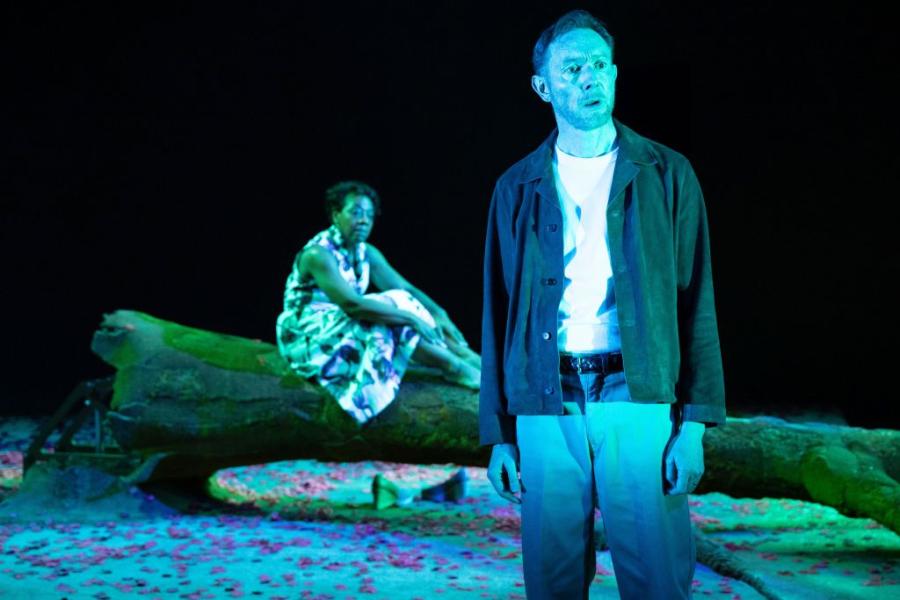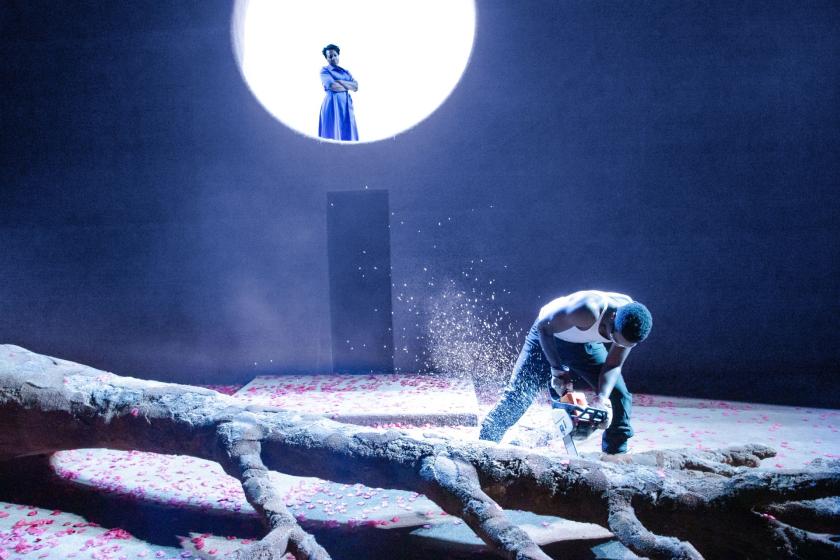Don't be fooled by the shambling geniality which first defines Bryan Cranston's Joe Keller at the start of the Belgian director Ivo van Hove's scorching revival of All My Sons. By the time we get to the interval-free finish, some 2-1/4 hours later, this seemingly affable chap will be as done in as the tree we see toppled in the production's wordless prologue.
As Joe goes down for the count, so too does the America of which he forms an all-too-ruthless part. Written in 1947, Arthur Miller's breakout play depicts a nation given over to deception and rapacity that responds only to one God - money - and this play, and van Hove's merciless take on it, should be required viewing now more than ever.
Van Hove transitioned from his status as an avant-garde darling to a mainstay of the mainstream a decade or so ago with his stripped-back A View from the Bridge, which travelled from the Young Vic to the West End and then Broadway, where he later revived The Crucible in a starry production that divided opinion but which knocked me for six. (View won him both an Olivier and a Tony.) This All My Sons in some ways is comparatively straightforward: though stripped scenically bare, except for his habitual designer Jan Versweyveld's all-important tree, there is no onstage shower as there was in View. Nor does this come with the airborne stage trickery that informed The Crucible.
Instead, the feeling here is of the screws being tightened on a smalltown Ohio community bound together in the worst possible way. One might be tempted to subtitle the production Secrets and Lies, and not just because its emotionally riven leading lady - Marianne Jean-Baptiste in an astonishingly belated West End debut - came to attention as an Oscar nominee for the Mike Leigh film of that very name.
Many will know the plot, given the comparative frequency with which this play gets done: 2019 saw concurrent revivals of it on both sides of the Atlantic. With Ibsenesque intensity, Miller hones in on the levels of deception besetting the Keller family, who have lost one son, Larry, much to the continued shock of a mother who refuses to honour that fact, and have a second son, Chris (Paapa Essiedu), who has taken up romantically with Ann (Hayley Squires, superb), a onetime "knockout" from next door who has returned home from New York, bringing hard-edged pragmatism with her. The truth-teller of the piece, Ann had in fact been Larry's fiancee prior to his death for reasons that rock the family's very foundations. The final reckoning is worthy not just of Ibsen but of Chekhov, too (think The Seagull).

Ann's father, Steve, has gone to prison for his part in supplying the air force with 120 cracked engine-heads that led to the deaths of 21 men. His senior partner, Joe, emerged scot-free, as is the way, we're told, of a world in which subordinates pay the price for the malfeasance of their superiors. This ongoing truism needs scant underlining: its contemporary applications exist everywhere around us.
Van Hove marks the play's three acts with the brief fall of a curtain, which quickly rises anew as further pressure is applied to all the characters to face facts. "You can be better," a gatheringly aggrieved Chris lets rip near the end, and the play sounds a death knell of sorts for a society sinking into a collectively malignant swamp. Nor is the struggle for survival easy amidst the psychic morass, as is clear from the distressed appearance midway through of Ann's brother, George (Tom Glynn-Carney, in electrifying form), who enters through the audience as a hoodie-wearing harbinger of upheaval - which, indeed, he turns out to be.
Some may want more specificity to a deliberately abstract production that suggests a universality to the behaviour on view that itself put me in mind of Simon McBurney's controversial Broadway take on this same play some while ago. (That version employed video, which this does not.) But one has to respect a director who shows no interest in the trappings of porches or gardens - the faceless set's back wall has a single aperture that begins after a while to represent an ominous, all-seeing eye.
The result gives full vent to the extraordinary commitment of a cast who together shed more tears than I think I've ever seen on one stage. (How they will sustain this engagement across an entire run is a separate matter.) Essiedu, in particular, brings a take-no-prisoners fury to Chris's awareness of the world as "a zoo", just as Cranston, a former colleague of van Hove on Network, submits by play's end to Joe's assessment of himself as "an old dead man": a 61-year-old for whom the pain of self-knowledge is too much to bear. Dry-eyed, but superb in a smallish role, is Richard Hansell as a local doctor who talks of living in "the usual darkness", which turns out to be the only place this play's misbegotten characters know as home.















Add comment